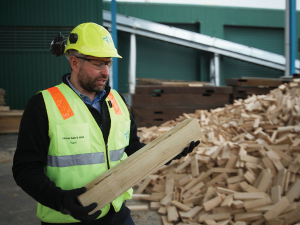New waste management rules in Marlborough will add impetus to recycling efforts by the wine industry, says Circular Wine Group member Jim White.
“We are wholly supportive of the changes, which make recycling options far more sensible from a financial point of view.”
Marlborough District Council introduced its Waste Management and Minimisation Bylaw 2025 on 1 September. It is designed to limit the ability for companies to take specified recyclable products to landfill, says the council’s Solid Waste Manager Mark Lucas. “This includes dripline, wires and vineyard posts."
Anyone bringing those products to dump has to fill out a Waste Acceptance Evaluation to show they have diverted as much as possible. As an example, post re-use company Repost may have taken a proportion of old posts, with the leftover deemed not fit for re-purpose. “Only then would these posts be accepted,” Mark says.
Posts and driplines are the largest waste source from the industry, which sends about 3,020 tonnes to Marlborough’s landfill each year, plus general waste collected from contractors. That volume is set to decline significantly with the new rules, Mark says. “Industry needs to divert as much as possible, which is a far more cost-effective option than sending it to landfill.” Meanwhile, vineyard replanting presents a great opportunity to build vineyards in a more sustainable manner, he says.
Posts and driplines are the largest waste source from the industry, which sends about 3,020 tonnes to Marlborough’s landfill each year, plus general waste collected from contractors. That volume is set to decline significantly with the new rules, Mark says. “Industry needs to divert as much as possible, which is a far more cost-effective option than sending it to landfill.” Meanwhile, vineyard replanting presents a great opportunity to build vineyards in a more sustainable manner, he says.
Operations helping divert waste include:
- Waste Management - recycling steel, cardboard and glass
- Future Post - turning waste plastics into durable posts
- Repost - recycling used fence posts
- Plasback - collecting and recycling farm plastics
- Green Circle - upcycling waste streams into carbon-based products
- Greenvine - repurposing expired grape vines into soil-enhancing resources
- One Forty One - producing MCA vineyard posts, which it accepts back at their end of life to burn in the company's kilns.
Read More:
Circular Sawmill
Marlborough’s OneFortyOne Kaituna Sawmill is producing vineyard posts with micronised copper azole (MCA) treatment, in lieu of the traditional arsenic treatment that sees broken posts taken to landfill. “Because MCA doesn’t contain arsenic, it changes the whole equation around disposal,” says Sales Manager Sam Lees. The sawmill has resource consent to include MCA-treated broken posts in its biomass fuel – combining it with sawdust and other wood residues to generate energy for kiln drying, creating a closed-loop, circular economy approach. “Material that would’ve ended up in landfill now gets a second life, helping power our operations.”
Less Lees in Landfill
A collaborative approach to circularity could see lees waste transformed to a vineyard resource, at no additional cost to companies.
A project being led by Bragato Research Institute, in partnership with Marlborough District Council, various waste companies, The Green Circle, and several interested wine companies, would divert about 6,000 cubic metres of winery lees from landfill, then use biochar and de-sludging technology to engineer a soil-enhancing product for vineyards.
BRI Sustainability Research Leader Dr Seth Laurensen says council has agreed to invest the current gate fee for disposal into the programme, meaning the engineered product can be returned to wine companies at no additional cost. It’s a circular solution that would ease pressure on the landfill, mitigate carbon emissions and enhance soil health, with different products engineered for different sites, he says.
Inclusion of biochar means the product could be recognised for carbon credits, Seth adds. While carbon in soil is not recognised by many emissions schemes, biochar is stable, and therefore acknowledged as a carbon store by Puro Earth, an international crediting platform for carbon removal. BRI is working with the Marlborough Circular Wine Group and gauging industry buy in for the project, before seeking co-funding from the Ministry for Primary Industries.





